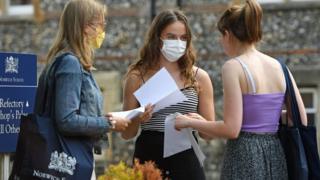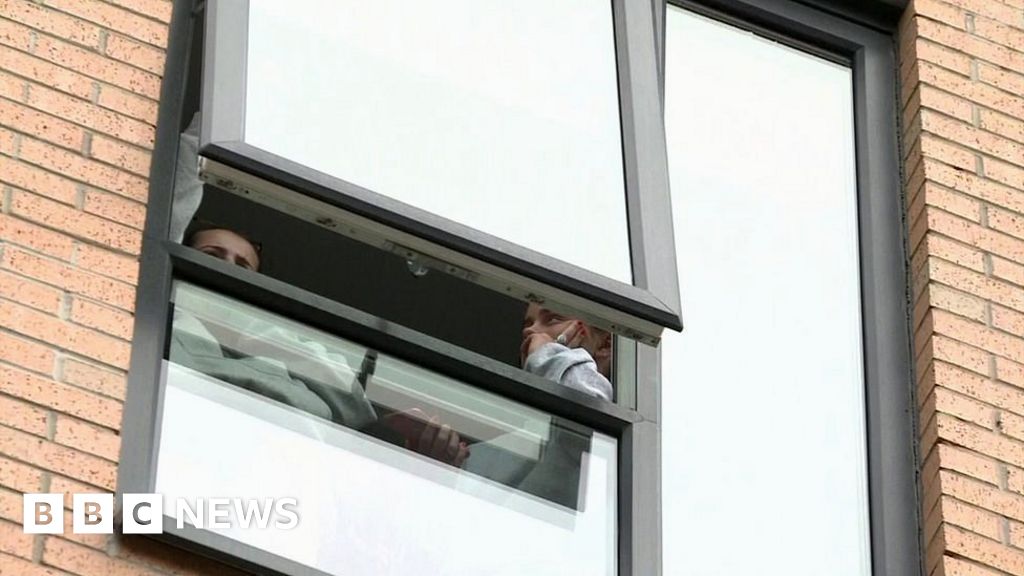 Image copyright
PA Media
Image caption
There has been widespread concern about the fairness of the 'calculated' results
Image copyright
PA Media
Image caption
There has been widespread concern about the fairness of the 'calculated' results
Labour has called on ministers to act immediately to sort out the "exams fiasco" in England and stop thousands of A-level students being "betrayed".
It said it was unacceptable that a "flawed system" had led to 280,000 pupils having their marks downgraded.
Sir Keir Starmer said ministers must follow the lead of Scotland and allow teacher assessed marks to be accepted.
But a minister said this risked "grade inflation" and disadvantaged pupils had not been disproportionately affected.
After exams were cancelled due to the pandemic, grades were awarded on Thursday on the basis on a controversial modelling system, taking into account schools' performance in previous years.
In England, 36% of entries had a lower grade than teachers predicted and 3% were down two grades.
'Injustice'
Labour said this was "heartbreaking" for those affected and the government was squarely to blame for sticking with a "fatally flawed results system".
"Across the last twenty four hours the scale of the injustice has become clear," the Labour leader said.
"Young people and parents right across the country, in every town and city, feel let down and betrayed.
"The unprecedented and chaotic circumstances created by the UK government's mishandling of education during recent months mean that a return to teacher assessments is now the best option available.
"No young person should be at a detriment due to government incompetence."
Labour is also calling for an urgent review of the standardisation model ahead of GCSE results next week.
The Equalities and Human Rights Commission has also urged the exams regulator Ofqual to consider the equality impacts of all their actions and mitigate against any potential negative affect on disadvantaged and minority groups.
EHRC Chief Executive, Rebecca Hilsenrath, called on the watchdog to publish a full breakdown of the differences between teacher assessed grades and the final grade.
"Students who have been downgraded must be able to appeal directly if they believe their grades are unfair," she said.
And the chairman of the Education Select Committee, Tory MP Robert Halfon, urged Ofqual to "explain properly how their model has worked and whether it has been fair".
Image copyright PA Media Image caption Many students were happy with their gradesBoris Johnson has defended what he said were a "robust set" of grades and said that pupils who believed they were treated unfairly would be able to appeal or, if they wanted, sit the exams in the autumn.
Detailed arrangements for appeals have yet to be announced but the government says they can be considered on the basis of higher mock results.
However, the use of mock results is controversial as schools run in them in very different ways and some are marked more harshly than others in order to prompt students to revise.
Speaking on BBC Breakfast, Minister Grant Shapps said more students from disadvantaged backgrounds had secured university places this year.
It was suggested to Mr Shapps that he was discounting statistics indicating that children from the most deprived areas have been hardest hit by results being downgraded.
Mr Shapps responded: "I don't [discount it], it's just that I'm reading an actual statistic - 7.3% more children from disadvantaged backgrounds, 18-year-olds, accepted to university this than last year, to which you're coming back and saying I don't agree with that, but you're not providing me any numbers.
"So yes I do think that more students from disadvantaged backgrounds are going to university and overall, as I say, we've got more been accepted to university than previously as well.
"So look, those are the figures. If you've got up some other figures then tell me, but that's the numbers I've got in front of me."
There was widespread anger on Thursday among schools, colleges and students after nearly 40% of A-level grades were lower than teacher predictions.
In England, 36% of entries had a lower grade than teachers predicted and 3% were down two grades in results after exams were cancelled by the pandemic.
Ofqual has warned that if teachers predictions were used it would have meant 38% of grades being As and A*s.
In the event, overall results for England, Northern Ireland and Wales show record highs for the top A and A* grades.
But in England, independent schools saw these top grades rise by almost five percentage points, while the equivalent figure for comprehensives was two percentage points and just 0.3 percentage points for further education colleges.

 5 years ago
1123
5 years ago
1123 
